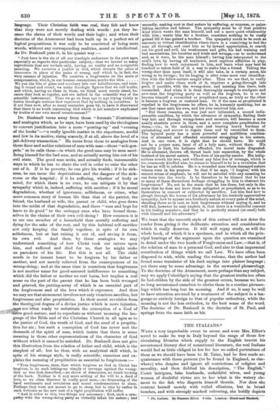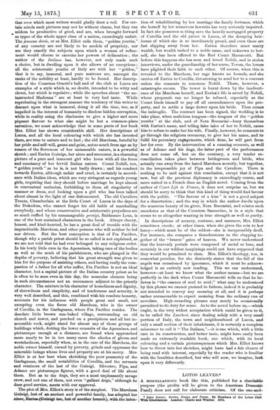THE ITALIANS.* WERE a very improbable event to occur, and
were Mrs. Elliot's novel to make its way in Italy beyond the range of those few circulating libraries which supply to the English tourist his accustomed literary diet of sensational literature, the real Italians would feel as little obliged to her for her so-called portraiture of them as we should have been to M. Taine, had he first made ac- quaintance with those persons (to be found in England, as else- where) who despise and ignore all restrictions of religion and morality, and then dubbed his description, "The English." Court intrigues, false husbands, unfaithful wives, and young women of doubtful virtue are to her what is the watery ele- ment to the fish who disports himself therein. Nor does she content herself merely with veiled allusions, but in broad touches, and with strongly marked colouring, she boldly depicts
The nations. By PISHOOS Elliot. 3 volt. Londonc Ilneotomid ElaeL that over which most writers would gladly draw a veil. For cer- tain minds such pictures may not be without charm, but they can seldom be productive of good, and are, when brought forward as types of the whole upper class of a nation, exceedingly unfair. The jennesse dorle, or as Mrs. Elliot calls them, "golden youths," of any country are not likely to be models of propriety, nor are they exactly the subjects upon which a woman of refine- ment would choose to exercise her powers of delineation ; the author of the Italians has, however, not only made such a choice, but in dwelling upon it she allows of no exceptions ; all the aristocratic youths of Italy are with her. "golden," that is to say, immoral, and pure matrons are, amongst the ranks of the nobility at least, hardly to be found. Her descrip- tion of the Countess Orsetti's ball and of the club at Lucca are examples of a style which is, no doubt, intended to be witty and clever, but which is repulsive ; while the speeches about "the un- instructed Madonna" are at least in very bad taste. While reprobating in the strongest manner the tendency of this writer to descant upon what is immoral, doing it all the time, too, as if impelled in the interest of humanity to disclose hidden corruption, while in reality using the disclosure to give a higher and more piquant flavour to what else might be but a common-place narration, we must acknowledge that in some parts of her book Mrs. Elliot has shown considerable skill. Her descriptions of Lucca, and all the local colouring with which she has invested them, are true to nature and to fact ; the old Marchese, hateful by her pride and self-will, gaunt and grim, not so much from age as by reason of the fierceness of her untameable nature, is a powerful sketch ; and Enrica Guinige, her niece and successor, is a charming picture of a pure and innocent girl who loves with all the force and constancy of her fervid Italian nature. Count Nobili, too, 44 golden youth" as he is, is not badly drawn ; and his conduct towards Enrico, although unfair and cruel, is certainly in accord- ance with Italian ideas, which are very stringent as regards young girls, requiting that they should before marriage be kept almost in conventual seclusion, forbidding to them all singularity of manner or dress, and looking upon a girl who has been talked about almost in the light of one dishonoured. The old Cavaliere Trenta, Chamberlain at the little Court of Lucca in the days of the Dukedom, who cannot forget his old habit of marshalling everybody, and whose conservative and aristocratic prejudices are so much ruffled by his unmanageable protige, Baldassare Lena, is one of the best sustained characters in the book. Always cheery, honest, and kind-hearted, he has a great deal of trouble with the impracticable Marchese, and other persons who will neither be led nor driven. But the beat conception is that of Fra Pacifico, though why a pariah priest should be so called is not explained, as we are not told that he had ever belonged to any religious order. In his lowly little cure in the Apennines, taking care of the bodies as well as the souls of his parishioners, who are plunged in the depths of poverty, believing that his great strength was given to him for the purpose of assisting others, and having really the com- passion of a father for all who suffer, Fm Pacifico is not an ideal character, but a capital picture of the Italian country priest as he is often to be seen even in this day, the muscular element being in such circumstances not an uncommon adjunct to the priestly character. The mixture in his character of homeliness and dignity, of shrewdness and simplicity, and of tenderness and severity, is very well described, and this, combined with his resolute honesty, accounts for his influence with •people great and small, not excepting even the fierce old Marchese, who is the owner of Corellia, in the Garfagnana, where Fm Pacifico resides. The desolate little brown sun-baked village, surrounding an old church and tower, and perched on a precipitous and all but in- accessible rock, might stand for almost any of those groups of buildings which, dotting the lower summits of the Apennines, and picturesque enough at a distance, are found when approached more nearly to be in too many cases the abodes of gloom and wretchedness, especially when, as in the case of the Marchese, the noble owner himself, cursed by poverty, grinds and oppresses the miserable beings whose lives and property are at his mercy. Mrs. Elliot is at her best when sketching the poor peasantry of the Garfagnana, the small notabilities of Corellia, and the servants and retainers of the last of the Guinigi. Silvestro, Pipe, and Adamo are picturesque figures, with a good deal of life about ' them. But as to the dogs, they are a most unpleasantly savage crew, and not one of them, not even "gallant Argo," although he does good service, meets with our approval.
The plot of Mrs. Elliot's story is of the simplest. The Marchese Guinigi, last-of an ancient and powerful family, has adopted her stieee,Enxisa.((lruinigi too, but of another branch), with the inten- I tion of rehabilitating by her marriage the family fortunes, which she herself by her numerous lawsuits has very seriously impaired. In fact she possesses nothing save the heavily mortgaged property of Corellia and the old palace in Lucca, of the decaying heir- looms of which she is so inordinately proud, and even these are fast slipping away from her. Enrico, therefore must marry wealth, but wealth united to a noble name, and unknown to her- self, she has been offered to the Red Count Marescotti. But before this happens she has seen and loved Nobili, and in stolen interviews, under the guardianship of her nurse, Teresa, the lovers have plighted their faith to each other. Of course, when this is revealed to the Marchese, her rage knows no bounds, and she carries off Enrica to Corellia, threatening to send her to a convent unless she consents to renounce Nobili. There, however, a catastrophe occurs. The tower is burnt down by the inadvert- ence of the Marchese herself, and Enrico's life is saved by Nobili, whose proposals can no longer be refused, especially as the Count binds himself to pay off all encumbrances upon the pro- perty, and to settle a large dower upon his bride. Then cornea the imbroglio. The contract has been signed, the wedding is to take place, when malicious tongues—the tongues of the "golden youths" at the club, and of Nera Bocciirini—busy themselves with Enrica's name, and telling false tales of her to Nobili, cause him to refuse to make her his wife. Finally, however, he consenta to go through the religious ceremony, to give her his name, and to fulfil his pecuniary engagements, which done, he will part from her for ever. By the intervention of a cunning avuocato, as well as of Adamo and his dogs, the latter part of the performance does not come off, but on the contrary, a very tender re- conciliation takes place between bridegroom and bride, who actually run away from the hated M.archesa secretly, but together, to the irrepressible joy of Pipa and the Cavaliere. There its nothing to be said against this conclusion, except that it is not new, but all the previous diplomacy is exceedingly coarse, and more suited to a French than an English novel. Coming from the author of Court Life in France, it does not surprise us, but we should be sorry to think that this kind of thing would find favour with the public. "The flavour of a kiss" is not a good subjeet for a dissertation ; and the way in which the author dwells upon the sensuous beauty of its giver, Nera Boccarini, and relates such anecdotes as that of the Countess Sansovino, is in a style that seems to us altogether wanting in true strength as well as purity.
In descriptions of scenery, costume, and manners, Mrs. Elliot sometimes excels; at other times, when she gives the rein to her fancy—which must be of the oddest—she is inexpressibly droll. For instance, she compares a thunderstorm to the clapping to- gether of the "brazen" gates of heaven. We never understood that the heavenly portals were composed of metal so base, and certainly in our wildest imaginings could not have supposed that they would be permitted to slam. Mrs. Elliot's theology, too, is somewhat peculiar, for she distinctly states that the fall of the angels was occasioned by ignorance, which it must be acknow- ledged is an entirely new reading. This we can understand, however—at least we know what the author means—but we are perfectly in the dark when Count Marescotti tells us that he be- lieves in "the essence of soul to soul ;" what may be understood by this phrase we cannot pretend to fathom, indeed it is probably not intended to convey any meaning at all, and it is perhaps rather unreasonable to expect meaning from the ordinary run of novelists. High-sounding phrases may surely be occasionally permitted to do duty for sense. As to the novel before us,—which ought, in the very widest acceptation which could be given to it, to be called the Lucchesi, since dealing solely with a very small portion of Italy, the town and neighbourhood of Lucca, and only a small section of their inhabitants, it is certainly a complete misnomer to call it "The Italians,"--it is one which, with a little care in its construction, and better taste, might have easily been made an extremely readable book, one which, with its local colouring and a certain picturesqueness which Mrs. Elliot knows how to throw into her sketches, might have had a fair chance of being read with interest, especially by the reader who is familiar with the localities described, but who will now, we imagine, look upon it very differently.



































 Previous page
Previous page